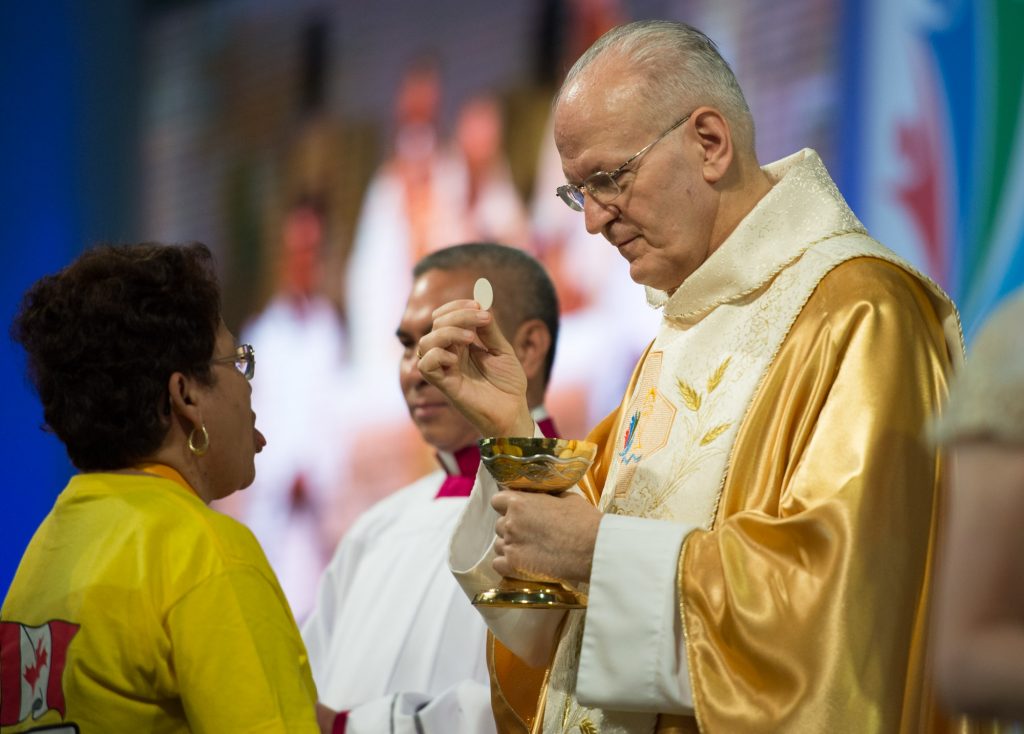Eucharist and Mercy

The Sacrament of the Holy Eucharist finds its fullest meaning in the person of Jesus Christ. He is the High Priest of God, the Bread came down from heaven and the Sacrifice offered by God for the salvation of the world. That is why Jesus is Himself called the sacrament of the Father to His Church. And for the Church, Jesus is the greatest icon of the Father’s mercy and love for humanity (Misericordiae Vultus, 1). Mercy is concretized on the cross when Jesus offers Himself as a sacrifice. There, blood and water flowed from His side to wash away the sins of the world.
The symbolisms of blood and water, as well as Jesus being offered as a sacrifice, speak of the very life of Jesus and the divine plan of the Father that must be fulfilled in obedience by Him. Nothing is beyond compare to the boundless grace of God that is celebrated and offered in the Eucharist. It is God who gives Himself to us in order to be taken, blessed, broken and shared to the world. Such a gratuitous gift is received by us despite our unworthiness. But because God is rich in mercy and abounding in love, He dwells in us and enters into our life in order to show us that our life has hope and a future in the loving embrace of God. The Holy Mass is the vivid testimony of this richness of God’s mercy and love for us. Our human sinfulness never hinders God to communicate His divinity with us in a covenanted relationship especially in the hours when we badly need Him the most. He keeps vigil with and for us all day long in order to assure us of His unfailing guidance, love and protection.
Consecrated persons like St. Faustina of Kowalska and Pope Francis see the Eucharist as the fountain of grace and mercy. In her diary, St. Faustina powerfully writes about the Eucharist saying, “Oh what awesome mysteries take place during Mass… this fountain of life gushing forth with such sweetness and power” (Diary 914). Pope Francis considers the Eucharist as “the summit of God’s saving action: the Lord Jesus, by becoming bread broken for us, pours upon us all of His mercy and His love, so as to renew our hearts, our lives, and our way of relating with Him and with the brethren” (Wednesday Audience, February 5, 2014). In the Constitution on the Sacred Liturgy, we also read: “Especially from the Eucharist, grace is poured forth upon us as from a fountain; and the sanctification of men in Christ and the glorification of God, to which all other activities of the Church are directed as toward their end, is achieved in the most efficacious possible way“(Sacrosanctum Concilium, 10). God’s grace is fully manifested in the outpouring of His mercy upon us through the Eucharist which is immeasurable and in return, it becomes the wellspring of life and grace that gives us a foretaste in the here and now of the full communion with the Father that characterizes the heavenly meal, the Eucharist.
The Eucharist, therefore, as the source and summit of our Christian life from which all our actions are directed invites us to live our life in eucharistic mercy that is made possible through the graced action of the merciful Eucharist, Jesus Christ. It is exemplified by Jesus for example when He is moved with pity for the hungry crowd and He feeds them that leads to their fill. It can also be concretized in the world today through our action as believers of the Eucharist to make ourselves vessels of grace and mercy to the lost, the last and the least. In His life, Jesus is usually recognized by His disciples in the breaking of the bread whereby He gave Himself not just as a companion on the journey but also as the bread of life that came down from heaven. If we are to be recognized as persons of the Eucharist and dispensers of mercy, we too are to be ready to imitate Jesus in loving and caring for the needy and helpless, to frequent the reception of the sacraments particularly the Eucharist and Reconciliation, and to perform the works of mercy that seeks to bear witness to the very life of God in us as a merciful Eucharist endowed with Eucharistic mercy.
